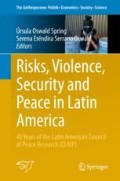Abstract
Forty years after its foundation in Oaxtepec , Morelos, Mexico , the Latin American Peace Research Council (CLAIP) has witnessed a deep transformation in Latin America and the Caribbean (LAC) . During the Eighties, the military regimes gradually gave way to democratically elected governments . However, the elites that had initially supported military coups adapted to emerging social and political conditions and kept their economic control in the majority of the countries in LAC. Thus, LAC is still the most unequal region in the world, even if wealth in other regions that opened up to the neoliberal model has also been concentrated into a few hands (USA, China, Russia , and South Korea ).
Prof. Dr. Úrsula Oswald Spring, research professor, at the Centre for Regional Multidisiciplinary Research (CRIM) in the National Autonomous University of Mexico (UNAM). She was President of IPRA (1998–2000) and has been Secretary General of IPRA (2016–2018) and CLAIP (2002–2005). Email: uoswald@gmail.com.
Dr. Serena Eréndira Serrano Oswald, associate professor at the Centre for Regional Multidisiciplinary Research (CRIM) in the National Autonomous University of Mexico (UNAM). She is Secretary General of CLAIP (2017–2019) and member of IPRA since 2000. Email: sesohi@hotmail.com.
Access this chapter
Tax calculation will be finalised at checkout
Purchases are for personal use only
Notes
- 1.
Bill Gates (USA; Microsoft co-founder: US$75,000 million); Amancio Ortega (Spain; Zara founder and Inditex owner: US$67,000 million): Warren Buffett (USA, main shareholder at Berkshire Hathaway: US$60,800 million); Carlos Slim Helú (Mexico, owner of Grupo Carso: US$50,000 million); Jeff Bezos (USA, Amazon founder and executive director: US$45,200 million); Mark Zuckerberg (USA, Facebook co-founder and CEO: US$44,600 million); Larry Ellison (USA, Oracle co-founder and CEO: US$43,600 million); Michael Bloomberg (USA, Bloomberg LP owner: US$40,000 million). Source: Forbes/Oxfam, January 2017. Financial speculation might change the order of the list, but these men are at the top of economic and thus political power.
References
Calveiro, Pilar (2012). Violencias de Estado, la guerra antiterrorista y la guerra contra el crimen como medios de control global, Mexico, D.F., Siglo XXI editores.
CEPAL (2015). Panorama Social de América Latina 2015, Santiago, CEPAL.
CEPAL (2016a). Panorama Social de América Latina 2016, Santiago, CEPAL.
CEPAL (2016b). XII Conferencia Regional sobre la Mujer en América Latina y el Caribe, Santiago, CEPAL.
CEPAL (2017). Informe anual sobre el progreso y los desafíos regionales de la agenda 2030 para el desarrollo sostenible en América Latina y el Caribe, Santiago, Cepal.
Composto, Claudia; Mina Lorena Navarro (2014). “Claves de lectura para comprender el despojo y las luchas por los bienes comunes naturales en América Latina”, in Claudia Composto, Mina Lorena Navarro (Eds.), Territorios en disputa. Despojo capitalista, luchas en defensa de los bienes comunes naturales y alternativas emancipatorias para América Latina, Mexico, D.F., Bajo Tierra Ediciones, pp. 33–75.
Díaz Vázquez, Julio A. (2015). “Cuba: actualización del modelo económico y social”; at: http://www.igadi.org/web/analiseopinion/cuba-actualizacion-del-modelo-economico-y-social.
Latour, Bruno (2013). “Facing Gaia: Six lectures on the political theology of nature”; at: https://macaulay.cuny.edu/eportfolios/wakefield15/files/2015/01/LATOUR-GIFFORD-SIX-LECTURES_1.pdf.
Le Clercq, Juan Antonio; Gerardo Rodríguez Sánchez Lara (2016). Índice Global de Impunidad México 2016 (IGI-MEX 2016), Puebla, UDLAP.
Melucci, Alberto (1996). “The Process of Collective Identity”, in Hank Johnston, Bert Klandermans (Eds.), Social Movements and Culture. Social Movements, Protest and Contention, Vol. 4, Minneapolis, University of Minnesota Press; https://pubhtml5.com/wqza/ghxs/basic/401-450.
Ostrom, Elinor (2009). “Governing the Commons”. The Evolution of Institutions for Collective Action, Bayreuth, Seminar on Political Ecology, University of Bayreuth.
Stiglitz, Joseph E. (2002). El malestar en la globalización, Madrid, Taurus Pensamiento.
Stiglitz, Joseph E. (2007). Globalisation and its Discontent, New York-London, W.W. Norton.
Stiglitz, Joseph E. (2010). Freefall. America, Free Markets, and the Sinking of the World Economy, New York-London, W.W. Norton.
Stiglitz, Joseph E. (2016). The Great Divide. Unequal societies and what we can do about them, New York-London, W.W. Norton.
van Dijk, Teun (2016). “Cómo el Globo manipuló la destitución de Dilma Rousseff”; at: http://e-ipol.org/wp-content/uploads/2016/09/Como-el-Globo-manipulo-la-destitucion-de-Dilma-Rousseff.pdf.
Wallerstein, Immanuel (2011). El moderno sistema mundial: La agricultura capitalista y los orígenes de la economía-mundo europea en el siglo XVI, Vol. 1, Mexico, D.F., Siglo XXI eds.
Author information
Authors and Affiliations
Corresponding author
Editor information
Editors and Affiliations
Rights and permissions
Copyright information
© 2018 Springer International Publishing AG, part of Springer Nature
About this chapter
Cite this chapter
Oswald Spring, Ú., Serrano Oswald, S.E. (2018). Introductory Remarks. CLAIP in the Face of the Challenges of Peace and Security in the 21st Century. In: Oswald Spring, Ú., Serrano Oswald, S. (eds) Risks, Violence, Security and Peace in Latin America. The Anthropocene: Politik—Economics—Society—Science, vol 24. Springer, Cham. https://doi.org/10.1007/978-3-319-73808-6_1
Download citation
DOI: https://doi.org/10.1007/978-3-319-73808-6_1
Published:
Publisher Name: Springer, Cham
Print ISBN: 978-3-319-73807-9
Online ISBN: 978-3-319-73808-6
eBook Packages: Earth and Environmental ScienceEarth and Environmental Science (R0)

